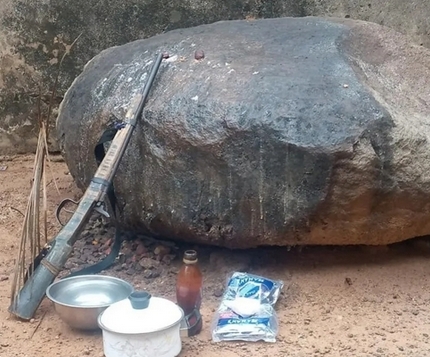
support@yorubalibrary.com
+2348073529208, 07038599574

The Yoruba people, with our rich cultural traditions, celebrate a variety of festivals throughout the year. One of the most significant among these is the Ogun Festival, dedicated to Ogun, the god of iron, war, and labor. This festival, steeped in history and tradition, honors Ogun's contributions to the Yoruba community and seeks his blessings for protection, strength, and prosperity. In this article, we explore the importance of the Ogun Festival and its role in Yoruba culture.
Who is Ogun?
Ogun is a powerful deity in the Yoruba pantheon, revered as the god of iron, war, and labor. He is believed to be the first Orisha to descend to Earth to prepare it for human habitation. Ogun's attributes include strength, resilience, and a warrior spirit, making him a vital figure for those who work with iron, such as blacksmiths, hunters, and warriors. He is also seen as a protector of the community, ensuring safety and justice.
The Origins of the Ogun Festival
The Ogun Festival dates back centuries and is deeply rooted in Yoruba history. It is traditionally celebrated in various Yoruba towns and cities, with each community adding its unique customs and rituals. The festival is usually held annually and is a time for communal gathering, reflection, and honoring the god Ogun.
Rituals and Celebrations
1. Offerings and Sacrifices
The Ogun Festival begins with offerings and sacrifices to appease Ogun and seek his blessings. These offerings often include items like palm oil, yams, kola nuts, and animal sacrifices, such as cocks and rams. The sacrifices are performed by the priests and devotees who invoke Ogun's spirit and offer prayers for protection and prosperity.
2. Processions and Drumming
Dynamic processions are a central feature of the Ogun Festival. Participants, dressed in traditional attire, carry iron implements and other symbols of Ogun. The processions are accompanied by drumming, singing, and dancing, creating a lively and energetic atmosphere. The drumming and chants are believed to call upon Ogun's spirit and invite his presence.
3. Feasting and Community Gathering
The festival is also a time for communal feasting. Large quantities of food and drink are prepared and shared among the community members, symbolizing unity and togetherness. The feasting is an essential part of the celebration, reflecting the abundance and blessings attributed to Ogun.
4. Wrestling Matches and Competitions
In some communities, wrestling matches and other physical competitions are held to honor Ogun's warrior spirit. These events showcase strength, skill, and bravery, reflecting Ogun's attributes and celebrating the physical prowess of the participants.
Cultural and Spiritual Significance
The Ogun Festival holds deep cultural and spiritual significance for the Yoruba people. It is a time to reconnect with their heritage, honor their ancestors, and reinforce communal bonds. The festival also serves as a reminder of the importance of hard work, resilience, and the protection provided by Ogun. By participating in the rituals and celebrations, the Yoruba people express their gratitude to Ogun and seek his continued blessings.
Conclusion
The Ogun Festival is a vibrant and significant celebration in Yoruba culture, honoring the god of iron, war, and labor. Through rituals, processions, feasting, and competitions, the Yoruba people pay homage to Ogun and seek his protection and blessings. This festival not only preserves the rich traditions of the Yoruba community but also strengthens the bonds of unity and cultural identity.

Learn about the Yoruba concept of Ìwà Pẹ̀lẹ́ (good…

Learn special praises for Divine Being and Creator…